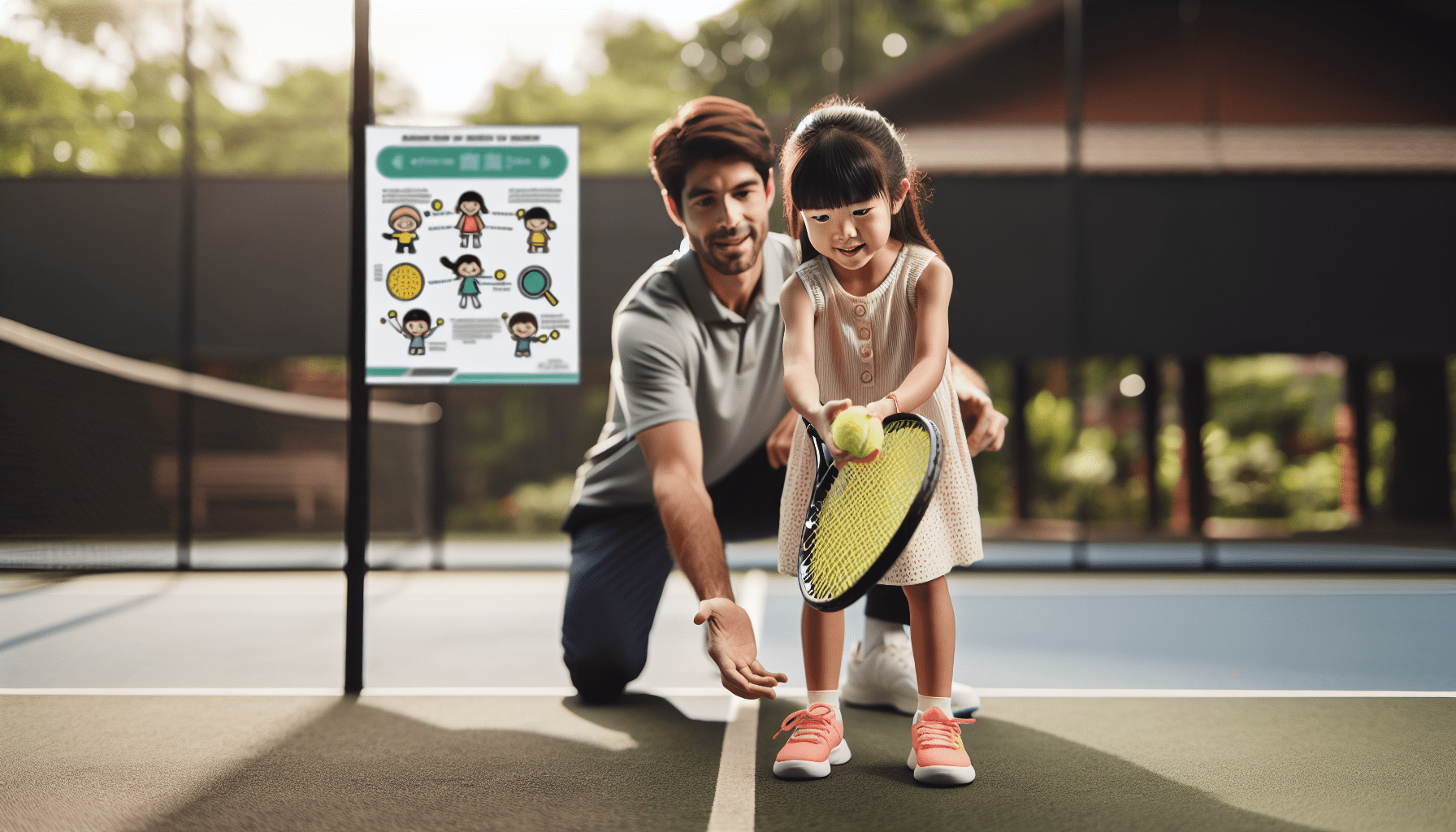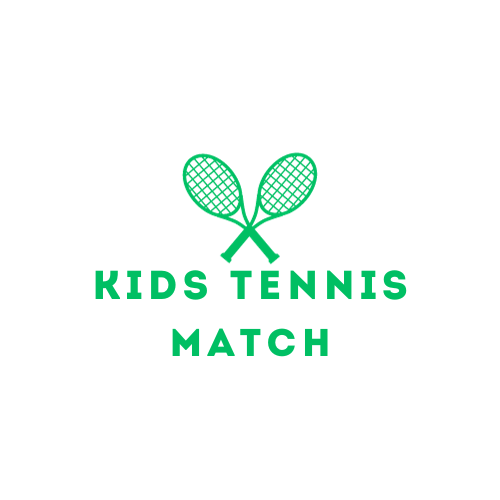Are you curious about when is the right time for your child to start playing tennis? Look no further! In this article, we will explore the age at which kids can begin their tennis journey. Whether your little one is showing interest in the sport or you want to introduce them to a fun and active hobby, we’ve got you covered. So, let’s dive into the world of tennis and reveal the perfect age for your child to grab a racket and hit the court!
Physical Development
Fine Motor Skills
Fine motor skills are crucial for success in tennis. These skills involve the coordination and control of small muscles in the hands, wrists, and fingers. Developing these skills enables young tennis players to have precise control over their racket, allowing them to hit the ball accurately. As a child grows, their fine motor skills improve, making it easier for them to handle a tennis racket with finesse.
Gross Motor Skills
Gross motor skills are essential for playing tennis as they involve the coordination and control of larger muscle groups in the body. These skills enable children to move around the court, execute powerful shots, and maintain balance while hitting the ball. By starting tennis at a young age, children have the opportunity to develop and refine their gross motor skills, which can greatly improve their overall athleticism and performance in the sport.
Psychological Readiness
Attention Span
Tennis requires focus and concentration, making attention span a crucial psychological factor. Starting tennis at a young age can help children develop and strengthen their attention span. As they engage in tennis drills and matches, they learn to maintain focus for longer periods, leading to improved performance on the court. Moreover, a longer attention span can benefit children in various aspects of their lives, both academically and socially.
Ability to Follow Instructions
Following instructions is an essential skill for any sport, including tennis. Young children who start tennis early have the opportunity to develop their ability to listen and comprehend instructions from their coaches. They learn how to apply these instructions effectively, both during practice sessions and competitive matches. This skill not only improves their tennis game but also promotes discipline and obedience in other areas of their lives.
Emotional Maturity
Tennis can be mentally and emotionally challenging, so it is important for children to have a certain level of emotional maturity before starting the sport. Starting tennis at a young age allows children to gradually develop emotional resilience and coping mechanisms, helping them handle the pressures and frustrations that may arise during matches. Additionally, tennis provides opportunities for character-building, such as teaching children how to manage victory and defeat with grace and sportsmanship.

Cognitive Abilities
Understanding Rules
Tennis has specific rules and regulations that players must understand and follow. By starting tennis at a young age, children have more time to familiarize themselves with these rules, allowing them to develop a solid understanding of the game. Understanding the rules not only helps children play tennis competently but also cultivates a sense of fairness and respect for the sport.
Tactical Thinking
Tennis is a strategic sport that requires players to think critically and make quick decisions during matches. Early exposure to tennis provides young players with opportunities to develop their tactical thinking skills. They learn to read their opponents, assess the court, and strategize their shots. Developing these skills at a young age allows children to become more proficient and adaptable tennis players as they progress in the sport.
Basic Tennis Skills
Hand-Eye Coordination
Hand-eye coordination is a fundamental skill in tennis. Starting tennis early allows children to develop and refine their hand-eye coordination, which is crucial for connecting with the ball and hitting accurate shots. As they practice various drills and exercises, young players gradually improve their hand-eye coordination, enabling them to react quickly to the ball and make precise contact with their racket.
Ball Control
Ball control involves the ability to manipulate the ball’s direction, speed, and trajectory. Starting tennis at a young age gives children ample time to practice and enhance their ball control skills. Through repetition and targeted exercises, young players learn how to control their shots, whether it’s hitting a precise drop shot or executing a powerful forehand. Developing good ball control is crucial for becoming a proficient and well-rounded tennis player.
Footwork
Footwork is a key aspect of tennis that involves moving efficiently and swiftly around the court. Starting tennis at a young age allows children to develop their footwork skills gradually. They learn how to position their feet correctly, make precise movements, and maintain balance while hitting the ball. Strong footwork not only enhances a player’s ability to reach difficult shots but also reduces the risk of injury on the court.

Equipment and Court Size
Appropriate Racket Size
Using the right racket size is essential for young tennis players to learn and enjoy the sport. Starting tennis early allows children to use appropriately-sized rackets designed for their age and physical development. These rackets are lighter and easier to maneuver, enabling young players to swing with better control and technique. Using the right racket size from the beginning helps children develop proper stroke mechanics, ensuring a solid foundation for their tennis skills.
Modified Court Size
Tennis courts can be intimidating for young beginners. However, starting tennis at a young age provides the opportunity for children to play on modified court sizes, specifically designed for their age and skill level. These modified courts have smaller dimensions, allowing young players to cover the court more easily and experience success during matches. Starting on modified court sizes builds confidence and gradually prepares children for playing on full-sized tennis courts as they grow older.
Instructor Guidance
Qualified Coaches
Starting tennis early provides children with the advantage of receiving guidance from qualified coaches. These coaches are experienced in teaching young players and can tailor their instruction to suit their specific needs. They focus on developing proper techniques, while also emphasizing the importance of sportsmanship and teamwork. Having qualified coaches at a young age ensures that children receive proper guidance and mentorship, setting them on the right path for success in tennis.
Age-Appropriate Training
Starting tennis at a young age allows children to engage in age-appropriate training programs. These programs are designed to suit the physical, psychological, and cognitive capabilities of young players. Training sessions incorporate fun and interactive drills to keep children engaged while gradually building their skills. Age-appropriate training ensures that children enjoy the learning process, leading to a positive and long-lasting experience in the sport.
Social Interaction
Group Activities
Tennis offers plenty of opportunities for social interaction, especially through group activities. Starting tennis at a young age allows children to participate in group training sessions and practice matches. These group activities foster teamwork, communication, and camaraderie among young players. They learn to cooperate, support one another, and develop valuable social skills that extend beyond the tennis court. The social aspect of tennis fosters friendships and a sense of belonging within the tennis community.
Playing with Peers
Starting tennis early enables children to play and compete with their peers. Peer interaction is invaluable in developing essential social skills such as communication, empathy, and sportsmanship. Playing with peers allows children to learn from one another, encourage each other’s progress, and forge strong friendships. Moreover, peer competition in tennis provides a healthy environment for personal growth, as young players learn to compete while maintaining respect and friendship.
Parental Support
Encouragement
Starting tennis at a young age requires parental support and encouragement. Parents play a vital role in motivating their children to participate in tennis and enjoy the sport. Encouragement helps children overcome initial challenges, build confidence, and develop a love for tennis. By actively showing interest and enthusiasm, parents can foster a positive attitude towards the sport, which goes a long way in nurturing a child’s passion and dedication for tennis.
Transportation
Starting tennis early often involves attending regular training sessions and matches. Parental support in providing transportation is crucial in ensuring that children can participate consistently in these activities. By ensuring reliable transportation, parents enable their children to fully engage in the sport, allowing for steady progress and development. Consistent participation increases the likelihood of success and enjoyment in tennis.
Time Commitment
Starting tennis at a young age requires a certain level of time commitment. Parents need to allocate time for their children to attend training sessions, matches, and practice sessions. Consistent practice and involvement in the sport are essential for skill development and progress. By understanding and prioritizing the time commitment required, parents can provide the necessary structure and support for their child’s tennis journey.
Individual Readiness
Interest in Tennis
Before starting tennis, it is important to gauge a child’s interest in the sport. Starting tennis early ensures that children have ample time to explore and discover their passion for tennis. Observing a child’s natural enthusiasm and curiosity towards the sport can serve as an indication of their readiness to begin training. Nurturing a child’s genuine interest in tennis enhances their motivation and enjoyment, leading to a more rewarding and fulfilling tennis experience.
Physical Activity Level
Considering a child’s physical activity level is crucial when deciding to start tennis. Tennis is a physically demanding sport that requires stamina, agility, and strength. Starting tennis at a young age allows children to develop and improve these physical attributes gradually. Assessing a child’s physical activity level helps in determining if they are ready for the physical demands of tennis. By starting early, children have time to build their physical fitness, ensuring a solid foundation for their tennis skills.
Advantages of Starting Early
Developing Fundamental Skills
Starting tennis at a young age provides ample time for children to develop and refine fundamental skills. These skills, such as hand-eye coordination, footwork, and ball control, are the building blocks of tennis proficiency. By starting early, children have the opportunity to practice these skills for a longer duration, ultimately leading to a stronger foundation and better technique as they progress in the sport.
Building Confidence
Starting tennis early allows children to experience success and build confidence on the court. As they practice and improve their skills, they become more confident in their abilities. Early achievements and positive experiences in tennis contribute to a child’s overall self-esteem and belief in their potential. Building confidence through tennis translates to other areas of a child’s life, providing them with the necessary resilience and self-assurance to face challenges head-on.
Establishing a Healthy Lifestyle
Starting tennis at a young age promotes a healthy and active lifestyle. Tennis is a sport that requires physical fitness, discipline, and mental focus. By participating in regular training and matches, children develop healthy habits and routines. They understand the importance of maintaining their physical well-being and are more likely to continue leading an active lifestyle as they grow older. Starting early exposes children to the benefits of physical activity, setting the stage for a lifetime of health and wellness.
In conclusion, starting tennis at a young age offers numerous benefits for children. From physical development to psychological readiness, cognitive abilities to social interaction, tennis provides a holistic platform for growth and development. By starting early, children have the opportunity to develop fundamental skills, build resilience, and establish a healthy lifestyle. Tennis not only nurtures athletic abilities but also instills valuable life skills such as discipline, teamwork, and sportsmanship. With the support of qualified coaches, parental encouragement, and a genuine interest in tennis, children can embark on a fulfilling and rewarding tennis journey that extends far beyond the boundaries of the court.
